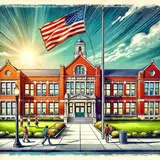Can Our Schools Save Democracy?

How can public schools better leverage their universal accessibility in order to improve civic outcomes for all students? In Educational Psychology Review, researchers M. Danish Shakeel, Patrick J. Wolf, Alison Heape Johnson, Mattie A. Harris, and Sarah R. Morris explore this and other questions in “The Public Purposes of Private Education: a Civic Outcomes Meta-Analysis.”
The study investigates the impact of private schooling on civic outcomes compared to public schooling. Analyzing 531 effects from 57 studies across 40 databases, the researchers found that private schooling is associated with a modest but statistically significant improvement in civic outcomes, including political tolerance, civic knowledge, political participation, and voluntarism. The positive effects are particularly pronounced for religious private schools.
The study also addresses long-standing debates about the role of education in forming democratic citizens. Advocates of public schools argue that their universal accessibility and government oversight make them better at promoting civic values, while proponents of private schools highlight their responsiveness to parental values and capacity to foster community engagement. This meta-analysis offers empirical evidence favoring private schools in nurturing specific civic values, particularly in political tolerance and knowledge. Still, the results vary based on school type, study quality, and regional context. The findings contribute to broader discussions on the civic role of education and its implications for policy and school choice.
Teachers have a personal hand in the development of students’ sense of civic responsibility. By encouraging civic engagement and cultivating a sense of social responsibility, teachers empower students to contribute positively to society. Ultimately, a focus on civic outcomes ensures that students are not only academically prepared, but also equipped to address the challenges and opportunities of a complex and interconnected world.